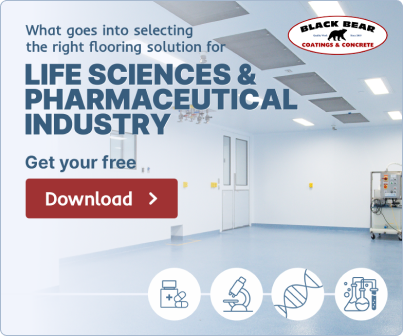Most people don’t realize the implications industrial flooring has on food processing plant. But the fact is, it’s one of the most important considerations manufacturers need to plan for.
Food processing plants are held to rigid safety standards imposed by the USDA and FDA. When engineered appropriately, a commercial flooring solution will actually improve hygiene and safety inside the plant.
Flooring that Resists Volatile Organic Compounds (VOCs)
Food processing plant flooring is subject to a number of byproducts, grease, oils and acids, in addition to moisture and liquid that can easily seep into the floor. These elements are a breeding ground for bacteria and pests alike. Mold and yeasts can form in small areas in and behind flooring, and can spread quickly – putting the health and safety of your staff and your customers at risk. Selecting a commercial flooring option that is seamless and impervious to water will diminish your risk of contamination.
Flooring that Withstands Sanitization Procedures
In a large area regulated by strict hygienic policies, cleaning products with harsh chemicals are typically used to sanitize the plant. These industrial-strength cleaning solvents have deteriorating properties that erode floors quicker than standard products. Food processing plant floors should be strong enough to withstand the sanitization process without breaking down. Any wear on a plant floor can lead to bacterial contamination and pose safety hazards.
Skid-Resistant Flooring
Industrial flooring in manufacturing plants endures constant stress. Motion from foot traffic and machinery tread are present around the clock. Engineering a seamless and durable solution will avoid buckling which can lead to dangerous working conditions. A skid-resistant surface will support productivity and eliminate the threat of falls and related risks.
When engineering a food processing plant flooring solution, you’ll want to ensure that it is impervious to moisture and resists absorbing various types of liquids. Concrete is porous and corrosive by design. Temperature and water can deepen the pores and cause increased growth of bacteria. Make sure your substrate is protected and the foundation is properly covered to avoid seepage. For example, engineered urethane is becoming a popular solution that will shield your foundation from contaminants.
Talk to Black Bear, the experts in commercial flooring, to learn more about developing options that will improve the safety of your food manufacturing plant. We would be happy to discuss what solution would best fit your needs. We have years of experience working with industry leaders in a variety of sectors. Black Bear is a leading concrete and coatings flooring company that serves New England – Maine, Massachusetts, New Hampshire, Northern Connecticut, Rhode Island, Vermont, as well as New York (north of New York City). Rest assured that we have the staff, equipment, and expertise needed to make your floor project a success.



